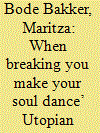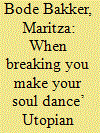| Srl | Item |
| 1 |
ID:
158425


|
|
|
|
|
| Summary/Abstract |
This article is based on a study of the Naturalz crew, a ‘breaking’ or breakdancing group in Quito, Ecuador. Breaking is commonly analysed as a subculture of resistance. We analyse two – often neglected – dimensions of this resistance: the significance of utopian aspirations and the role of the body in subjective transformation. We argue that participants enact utopian values in breaking, for instance by affirming the value of street life and people from the streets. Furthermore, we see that breaking leads to subjective transformation among its young practitioners and that the body plays a central role in this change of subject position. It is interesting that girls use breaking to rebel against dominant images of ideal womanhood, resulting in changes in gendered subjectivity. Hence, from disempowered, marginalised young people, breakers turn into determined agents with physical strength and emotional resilience.
|
|
|
|
|
|
|
|
|
|
|
|
|
|
|
|
| 2 |
ID:
160101


|
|
|
|
|
| Summary/Abstract |
This article is based on a study of the Naturalz crew, a ‘breaking’ or breakdancing group in Quito, Ecuador. Breaking is commonly analysed as a subculture of resistance. We analyse two – often neglected – dimensions of this resistance: the significance of utopian aspirations and the role of the body in subjective transformation. We argue that participants enact utopian values in breaking, for instance by affirming the value of street life and people from the streets. Furthermore, we see that breaking leads to subjective transformation among its young practitioners and that the body plays a central role in this change of subject position. It is interesting that girls use breaking to rebel against dominant images of ideal womanhood, resulting in changes in gendered subjectivity. Hence, from disempowered, marginalised young people, breakers turn into determined agents with physical strength and emotional resilience.
|
|
|
|
|
|
|
|
|
|
|
|
|
|
|
|